|
|
 |
 |
  |
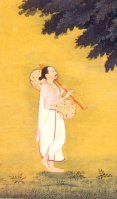 |
|
|
 |
| |
|
|
|
|
| |
|
|
Kalidasa’s
Meghadutam |
|
| |
|
|
|
|
| |
|
|
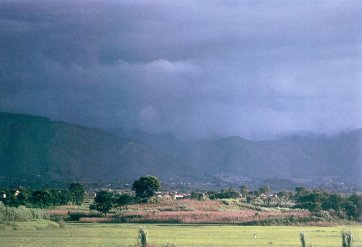 |
|
| |
|
|
|
| |
|
|
|
| |
|
|
|
| |
|
|
|
| |
|
|
|
| |
|
|
|
|
| |
|
|
|
|
| |
|
|
|
|
| |
|
|
|
|
| |
|
|
|
|
| |
|
|
|
|
| |
|
|
|
|
|
| |
|
|
No, No, No this is not your regular column. We will have a Subject Moderator for
Literature and Poetry |
|
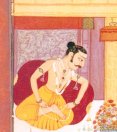 |
|
|
in the near future. But till then … it would be a real shame to launch
India without Poetry. OK ? |
|
| |
|
|
|
|
| |
|
So where do we begin ? |
|
| |
|
|
|
|
| |
|
Let me take you to the
4th Century A.D. The Gupta dynasty was at its height. Chandra
Gupta II reigned |
|
| |
|
with
a new name Vikramaditya. It was a time of peace and prosperity. Culturally India was influencing |
|
| |
|
lands as far away as Bali and Sumatra. The city of Ujjayini
was a place of splendour unequalled
in the |
|
| |
|
world. |
|
| |
|
|
|
|
|
| |
|
|
Sometime then an orphan Brahmin boy grew up to be a very handsome youth. His devotion
to the |
|
| |
|
|
goddess Kali earned him the name
KALIDASA. He probably lived in Ujjayini and became a creative |
|
| |
|
|
writer of awesome prowess. |
|
| |
|
|
|
|
|
| |
|
|
This month we will take a look at his beautiful poem
Meghadutam, the Cloud Messenger. I'm giving you |
|
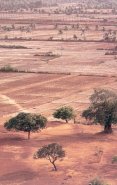 |
|
|
Chandra Rajan's translation as the backdrop. It's in modern English. Easy
to grasp and lovely in |
|
| |
|
texture
and feel. I'm sure you'll love it. |
|
| |
|
|
|
|
| |
|
The Monsoon and Rain Clouds. That's the setting for Kalidas's love poem. It's an
endorsement of the |
|
| |
|
prime
Indian season for lovesickness, introspection, pathos and fantasy. While the West has always |
|
| |
|
glorified Spring, because it breathes new life after a
wintry death; India revels in the Monsoon.
The |
|
| |
|
rains bring life back after the dry death of
Summer. It is The SEASON but not for the reasons that the |
|
| |
|
West loves the Spring for. |
|
| |
|
|
|
|
| |
|
| What were Rabindranath Tagore's feelings on the Monsoon?
|
|
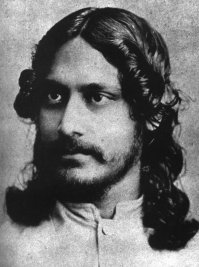 |
| He felt that Spring was sweet and like all sweets, the palate
|
|
| cannot handle too much of it. The multidimensional element
|
|
| of the Monsoon poses a greater challenge to the spirit of Man,
|
|
| which Spring with her one-dimensional joy, cannot compete
|
|
| with. Spring is about running outdoors where the mind travels
|
|
| to many directions. Monsoon is about staying in. The mind is
|
|
| in one Space Time element where it introspects. I want joy
|
|
| in Spring. I want to explore my soul in the Monsoon. The
|
|
| Senses come alive in Spring. The Self takes charge in the
|
|
| Monsoon - the subconscious need to Be, to feel my deepest
|
|
| longings, my desires for all the unstated wants that constitute
|
|
| my being, my core existence.
|
|
|
|
| |
|
|
| |
|
|
| |
|
|
|
| |
|
|
|
| |
|
|
|
 |
|
|
|
| |
|
|
| |
|
|
| |
|
|
| |
|
|
| |
|
|
| |
|
|
| |
|
|
|
|
| |
|
Tagore takes this a step further and argues that in the Monsoon this element of the self,
searching for
|
|
| |
|
fulfillment, for identity, for form - creates far greater pain in lovers, separated
and yearning for each
|
|
| |
|
other, than at any other time. My need to fill up my soul's emptiness
creates a heightened desire
for
|
|
| |
|
|
my soul companion, whose absence can become intolerable.
|
|
| |
|
|
|
|
|
| |
|
|
So Kalidas sets his story in the Monsoon. Where separated lovers pine in anguish more
than in any
|
|
| |
|
|
other season.
|
|
| |
|
|
|
|
|
| |
|
|
He uses a thin story line drawn from a little known tale of a Yaksha who incurred the wrath
of Kubera,
|
|
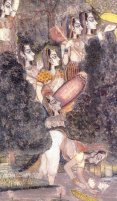 |
|
|
the
God of Wealth. Yakshas and Yakshis were manifestations of the Spirit of
Nature. They protected
|
|
| |
|
groves and pools. They could be mini
Gaias. They had wisdom, grace
and divinity. You may
|
|
| |
|
remember the intellectual battle Yudhistir in the
Mahabharat, had with
a Yaksha guarding a pool. The
|
|
| |
|
water from which he could drink only if he replied correctly
to all the questions asked by the
Yaksha.
|
|
| |
|
|
|
|
| |
|
Well, our Yaksha happened to be very lovesick and neglected his duties of guarding
Kubera's beautiful
|
|
| |
|
groves and gardens. In his absence Indra's celestial elephant Airavata
ravages the gardens and
|
|
| |
|
destroys the golden lotuses of the holy lake
Manasa.
|
|
| |
|
|
|
|
| |
|
Kalidasa has a fascination for passionate obsessive love that overrides everything including
one's
|
|
| |
|
duty.
In both Meghadutam and Sakuntala he uses this situation to explore the seeds
of tragedy that
|
|
| |
|
seem to be ingrained in love obsessions.
|
|
| |
|
|
|
|
|
| |
|
|
The Yaksha is banished by Kubera and separated from his loved one. |
|
| |
|
|
|
|
|
| |
|
|
It 's here that our poem begins. |
|
| |
|
|
|
|
|
| |
|
|
Written by Kalidasa in the difficult Mandakranta metre for
114 stanzas. A near impossible poetic
|
|
 |
|
|
journey of many
intellectual dimensions.
|
|
| |
|
|
|
|
| |
|
| The lost, lonely Yaksha is at Ramgiri in the Vindhya
|
|
 |
| mountains. He is both passion filled and passion ridden. |
|
| His anguish at being separated from his love is intense.
|
|
| He is desperate to reunite with his Yakshi and in his lovesick
|
|
| state he seizes upon the idea of making a rain cloud his
|
|
| messenger.
|
|
| |
|
| “ The sight of rain clouds makes even happy hearts
|
|
| stir with restlessness;
|
|
| What then of one far from her who longs
|
|
| to hold him in close embrace.
|
|
| |
|
| ………Indeed the love sick, their minds clouded,
|
|
| confuse the sentient with the insentient.”
|
|
|
|
| |
|
|
| |
|
|
| |
|
|
| |
|
|
| |
|
|
| |
|
|
| |
|
|
| |
|
|
| |
|
|
| |
|
|
| |
|
|
| |
|
|
| |
|
|
| |
|
The cloud becomes the Yaksha's alter ego. It is him in spirit and thought. He invests in it
|
|
| |
|
his love messages for his beloved. He exhorts the cloud to travel to the Himalayas where
|
|
| |
|
|
his love waits for him, in anguish and pain.
|
|
| |
|
|
|
|
|
| home |
|
|
The cloud's journey is seen in the Yaksha's mind's eye and this is really what the body of
the poem is
|
|
| prologue |
|
|
about. The different terrains. The variety of sights. The beauty of Nature in all
her glory as the cloud
|
|
| welcome |
|
|
travels from the Vindhya mountains to the Himalayas. And of course
throughout the journey
there is
|
|
| contents |
|
|
love play, passion, love play and passion. Because that is
the dominant thought controlling the love
|
|
| subject
moderators |
|
|
sick and lonely Yaksha's mind.
|
|
| history |
|
|
|
|
|
| sexuality |
|
|
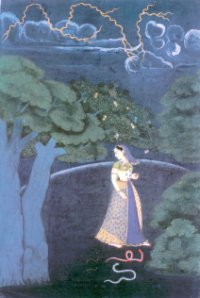 |
|
“…the unalloyed fulfillment of a lover's desire,
|
| |
tasting Vetravati's sweet waters as a lover her beloved lips. |
| |
|
| |
…the hill loudly proclaims through grottoes |
| |
exhaling fragrances of pleasure, |
| |
passions unrestrained of the city's youth |
| |
dallying there in love sports with courtesans. |
| |
|
| |
…prolonging the piercing cries of love maddened saras cranes |
| |
Refreshing to the tired limbs of women
|
| |
After passion's ecstatic play, it removes
|
| |
Their languor like an artful lover
|
| |
Playing with his love with amorous entreaties.
|
| |
|
| |
….For who can bear to leave a woman, her loins bared,
|
| |
Once having tasted her body's sweetness?”
|
|
|
| social
landscapes |
|
|
|
| art
|
|
|
|
| dance |
|
|
|
| literature
|
|
|
|
| music |
|
|
|
| cinema |
|
|
|
| environment
|
|
|
|
| economics |
|
|
|
| pot
pourri |
|
|
|
| feedback |
|
|
|
| |
|
|
|
| |
|
|
|
| |
|
|
|
| |
|
|
|
 |
|
|
|
| |
|
| One
of my favorite stanzas, because it makes me laugh in amusement, is
the instruction
|
|
| on
behavior given to the cloud when it encounters women going to secret
assignations.
|
|
| Here
it is and do remember that it was written 1700 years ago!
|
|
| |
|
 |
|
| “ Young women going to their lover's dwellings at night
|
|
|
| set out on the royal highway mantled
|
|
|
| in sight-obscuring darkness you could pierce with a pin;
|
|
|
| light their path with streaked lightning
|
|
|
| glittering like gold ramp on a touchstone,
|
|
|
| but do not startle them with thunder and pelting rain
|
|
|
| for they are easily alarmed.”
|
|
|
|
|
| |
|
|
| |
|
|
| |
|
|
| |
|
|
| |
|
|
| |
|
|
| |
|
|
| |
|
|
| |
|
|
| |
|
|
| |
|
|
And it gets better and better. There are myths relived in the poetic telling. Of ancient
battles fought. |
|
| |
|
|
Heroes
of the past come alive. Alliterative passages bring back memories of forgotten tales. Tales |
|
| |
|
|
like Indra cutting off the wings of mountains so that they stopped
flying and creating havoc. |
|
| |
|
|
|
|
|
| |
|
|
And the clouds which really were the cut off wings, always gravitating to the mountains.
Don't they |
|
| |
|
|
even today? Kalidasa uses alliterations and subtle references to myths without
detailing. Because |
|
| |
|
|
detailing would have clogged the narrative flow. |
|
| |
|
|
|
|
|
| |
|
|
He compares his woman to various aspects of nature and yet cannot measure the parts to
her |
|
| |
|
|
entirety.
Only the totality of Nature can fulfill that fantasy. |
|
| |
|
|
|
|
|
 |
|
|
The importance of Nature as a feminine entity and as an influence on our psyche, our soul
and our |
|
| |
|
spirit is today's story of Eco-Feminism and Eco-Psychology. New subjects in a
world grappling to |
|
| |
|
free itself from Post Modernism. So how did Kalidasa figure it all out in
500 A.D.? And how come we've |
|
| |
|
lost it for so long? |
|
| |
|
|
|
|
| |
|
The cloud carries us to Mahakala. We witness Shiva's cosmic dance and the ethereal.We remember the |
|
| |
|
churning of the ocean and the drinking of poison. Then to Alaka
described lovingly as the celestial |
|
| |
|
version of
Ujjayini. |
|
| |
|
|
|
|
| |
|
The alter ego meets up with the lovely Yakshi, waiting for her man and finding Time
impossible to |
|
| |
|
live through. |
|
| |
|
|
|
|
| |
|
|
| “Wasted by anguish |
|
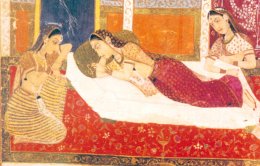 |
| She would be lying on her bed of loneliness |
|
| Drawing herself together on one side, |
|
| Seeming like the last sliver |
|
| Of the waning moon on the eastern horizon. |
|
| By my side her nights flew by |
|
| On winged moments in rapture's fullness; |
|
| Now they drag on heavy with her burning tears.” |
|
|
|
| |
|
|
|
| |
|
|
|
| |
|
|
|
| |
|
|
|
| |
|
|
|
| |
|
|
|
| |
|
|
|
| |
|
|
|
|
|
| |
|
|
And what of the end? Where does Kalidasa go after 110 stanzas? Not a reunion but a slice
|
|
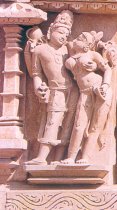 |
|
|
of Hope because we live, travel and survive on Hope. Don't we?
|
|
| |
|
|
|
| |
|
We pay for our joys with penance. We earn our ecstasies with sufferance. Great upward
surges of the
|
|
| |
|
spirit and the senses rest upon the pillars of anguish and pain. Pleasure
delayed is pleasure
|
|
| |
|
multiplied. A message, Time's corrosive touch cannot erode.
|
|
| |
|
|
|
|
| |
|
| “…my curse shall be ended; closing your eyes
|
|
 |
| make the four remaining months go by;
|
|
| then on autumnal nights bright with moonlight
|
|
| we two shall taste together every desire
|
|
| eagerly imagined when we were apart.
|
|
|
|
| …the lack of pleasure makes the craving intense
|
|
| for what is desired, piling it up into love's great hoard.”
|
|
| |
|
| Ta, Love,
|
|
|
|
| |
|
|
| |
|
|
| |
|
|
| |
|
|
| |
|
|
| |
|
|
| |
|
|
| |
|
|
|
| |
|
|
|
| |
|
|
Gautam
|
|
| |
|
|
|
|
|
| |
|
|
|
|
|
| |
|
|
|
Background
Readings
|
|
| |
|
|
|
TOP
|
|
| |
|
|
|
|
|
![]()
![]()
![]()

![]()














